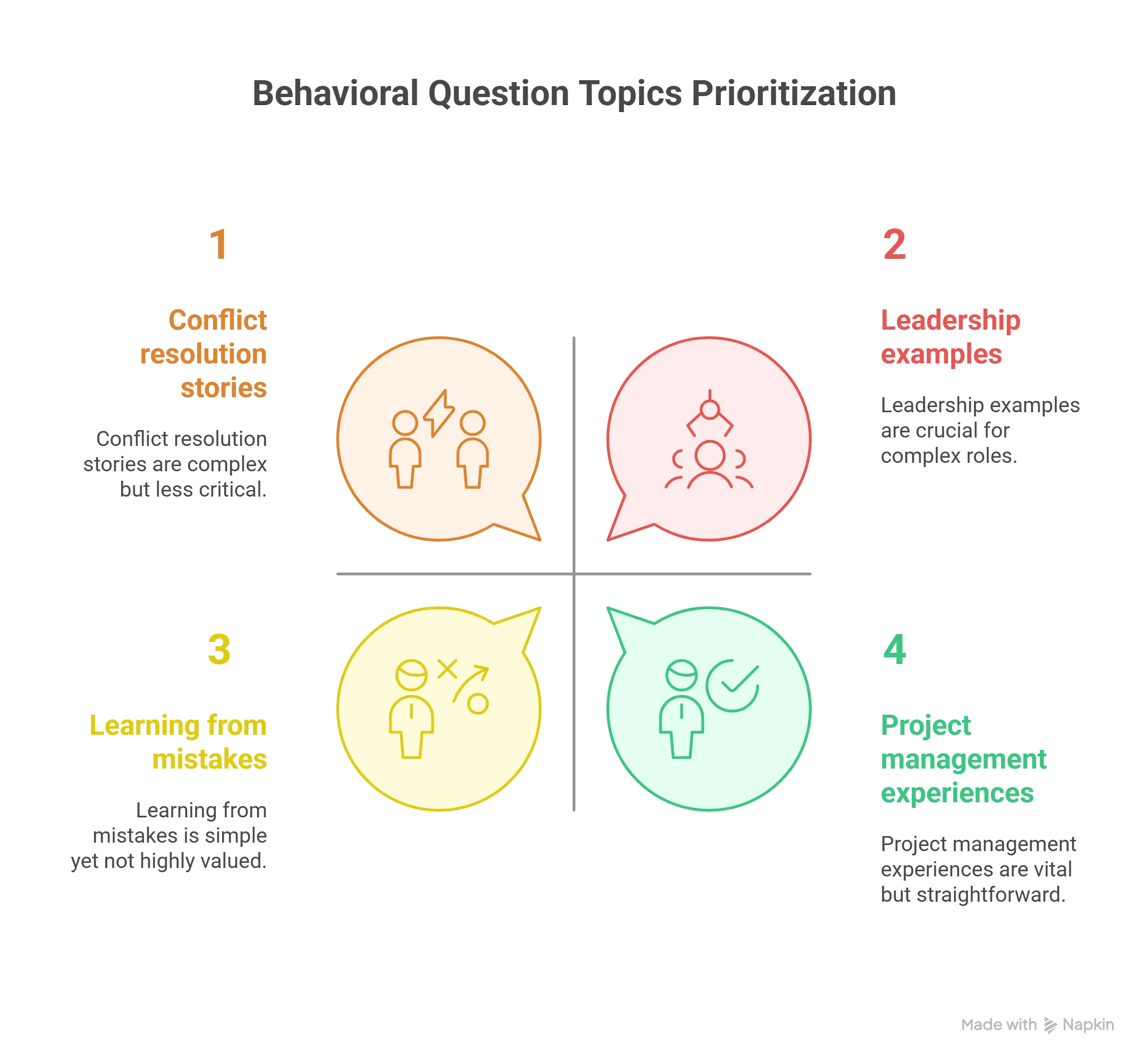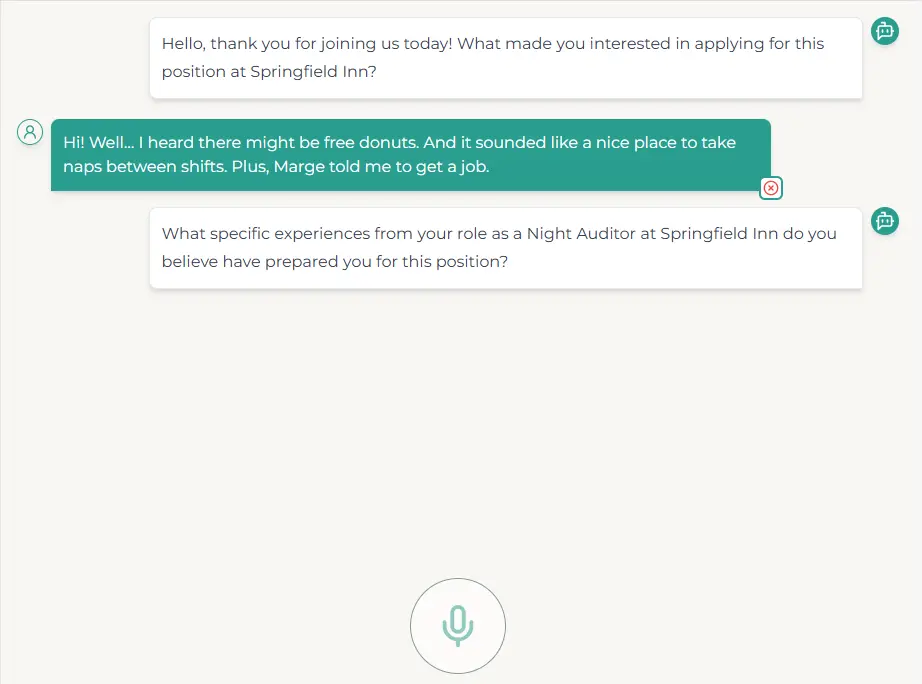
Tech interviews can make or break your career in software development. This tech interview guide shows you exactly how to prepare for technical interview questions and pass technical interviews. Whether you're a beginner or experienced developer, these proven strategies will help you land your dream job.
Modern tech interviews test more than just coding skills. They check how you solve problems, communicate ideas, and work with others. Success comes from smart preparation, not just studying algorithms all day.
How to Prepare for Technical Interview Questions
How to prepare for technical interview questions starts with understanding what companies actually test. Most tech interviews have four main parts:
| Interview Part | Time to Spend | What to Focus On | How to Succeed |
|---|---|---|---|
| Coding Problems | 40% of prep time | Data structures, algorithms | Write clean, working code |
| System Design | 25% of prep time | Building scalable systems | Discuss real trade-offs |
| Behavioral Questions | 20% of prep time | Leadership, teamwork | Use clear examples |
| Communication | 15% of prep time | Explaining your thinking | Talk through your process |
This breakdown answers the biggest question: how to pass technical interviews consistently. Spend your study time according to these percentages for best results.
Master Coding Challenges Step by Step
Technical interview questions focus on core programming concepts. Learn these areas first:
Most Important Data Structures:
- Arrays and strings (show up in 40% of coding questions)
- Hash tables and sets (25% of coding questions)
- Trees and graphs (20% of coding questions)
- Linked lists and stacks (15% of coding questions)
Key Algorithm Patterns:
- Two pointers and sliding window
- Tree and graph traversal (DFS/BFS)
- Dynamic programming basics
- Binary search variations
Practice 2-3 problems daily on LeetCode. Focus on explaining your thinking out loud while you code. Interviewers care as much about your process as your final answer. Check our complete software developer interview guide for more detailed preparation strategies.
System Design Made Simple
System design interviews test how you build large-scale applications. How to conduct technical interviews from the interviewer's view shows what they really want to see:
Core System Design Topics:
- Load balancing and scaling strategies
- Database choices (SQL vs NoSQL)
- Caching (Redis, Memcached)
- Microservices basics
- Message queues for async processing
System Design Interview Steps:
- Ask questions about requirements (5 minutes)
- Draw high-level architecture (15 minutes)
- Dive deep into key components (15 minutes)
- Talk about scaling and trade-offs (10 minutes)
Focus on real systems you've worked with instead of just theory. Talk about actual problems you've solved.
Ace Behavioral Questions
Behavioral questions check if you're a good culture fit. Use the STAR method (Situation, Task, Action, Result) to structure your answers:
Key Behavioral Topics:
- Leadership examples (even without managing people)
- Conflict resolution stories
- Project management experiences
- Technical decision-making
- Learning from mistakes
Prepare 5-6 detailed stories that show these skills. Make each story relevant to the job you want. Learn more about proven interview answer structures to improve your responses.
Many developers feel nervous during interviews. Understanding imposter syndrome in tech can help you feel more confident.

Communication That Gets You Hired
Clear communication separates good candidates from great ones. Follow this process during technical interviews:
How to Communicate During Problem Solving:
- Repeat the problem in your own words
- Ask questions about edge cases
- Explain your approach before coding
- Talk through your reasoning while writing code
- Test your solution with examples
- Discuss how to make it better
Practice explaining your thinking during mock interviews. Record yourself solving problems to find communication gaps. Remember that body language matters just as much as what you say.
8-Week Preparation Plan
How to prepare for technical interview questions depends on your experience and target companies. Here's a proven timeline:
Week-by-Week Schedule:
- Weeks 1-2: Learn algorithm basics and solve easy problems
- Weeks 3-4: Practice medium problems and learn patterns
- Weeks 5-6: Study system design concepts
- Weeks 7-8: Do mock interviews and practice behavioral questions
Daily Study Plan (2-3 hours):
- 90 minutes: Solve algorithm problems
- 30 minutes: Learn system design
- 30 minutes: Practice behavioral questions
Study consistently instead of cramming right before interviews. Regular practice works much better.
Prepare for Different Company Types
Different companies focus on different interview areas. Research your target companies:
Big Tech Companies (Google, Meta, Amazon):
- Hard algorithm problems that need optimal solutions
- Behavioral questions about leadership principles
- System design for senior roles (3+ years experience)
Startups and Mid-Size Companies:
- Practical coding problems related to business needs
- Architecture discussions about real constraints
- Culture fit and adaptability questions
Google's Technical Development Guide has excellent resources for algorithm-heavy interviews.
AI-Powered Mock Interview Practice
Mock interviews reveal preparation gaps that studying alone can't fix. Today, you have both traditional and AI-powered options to practice effectively.
Traditional Mock Interview Strategies:
- Simulate real conditions (whiteboard, time pressure)
- Practice with experienced developers or mentors
- Record sessions to review your communication
- Ask for specific feedback on technical and behavioral answers
LeetCode is excellent for algorithm practice, but you can easily simulate interviews for your target job using AI tools like Gemini, ChatGPT, or Claude with good prompts. Try our AI job interview simulator to practice with realistic questions for your specific role.

Effective AI Interview Prompts:
- "Act as a Google software engineer interviewer and ask me system design questions"
- "Interview me for a frontend developer role at a startup"
- "Give me behavioral questions for a senior backend engineer position"
- "Conduct a technical screening for a Python developer role"
Combine both approaches: use AI for daily practice and flexibility, then do traditional mock interviews weekly for realistic feedback from experienced developers.
Execute on Interview Day
How to pass technical interviews includes performing well on the actual day:
Before the Interview:
- Review your resume and project details
- Prepare smart questions about the role and company
- Test your technology setup for remote interviews
- Arrive 10-15 minutes early
During the Interview:
- Listen carefully to problem statements
- Ask clarifying questions before coding
- Explain your thought process constantly
- Handle mistakes calmly and fix them
- Work collaboratively with your interviewer
For more interview preparation resources, check out Tech Interview Handbook and GeeksforGeeks Interview Prep.
Avoid These Common Mistakes
Understanding common mistakes helps you avoid pitfalls that eliminate good candidates:
Technical Mistakes:
- Starting to code without understanding the problem
- Trying to find perfect solutions instead of working solutions first
- Ignoring edge cases and error handling
- Using poor variable names and messy code organization
Communication Mistakes:
- Coding silently without explaining your thinking
- Arguing with interviewer feedback
- Giving up too quickly when stuck
- Not asking clarifying questions
Practice handling mistakes gracefully. Interviewers often care more about how you deal with challenges than perfect performance.
Prepare Your Resume for Tech Interviews
Your resume gets you to the interview, but it also comes up during behavioral questions. Make sure your resume tells a clear story about your technical journey.
If you're just starting out, don't worry. Many developers successfully land their first tech roles with the right approach. Learn how to create a compelling resume even if you're starting without experience.
Focus on projects, internships, bootcamps, and self-taught skills. Show your passion for learning and building things.
Frequently Asked Questions
How many algorithm problems should I solve before interviews?
Focus on understanding patterns instead of just solving lots of problems. Aim for 75-100 problems across different types (arrays, trees, graphs, dynamic programming). Make sure you really understand each solution.
What if I don't know a specific algorithm during the interview?
Stay calm and explain your thinking step by step. Interviewers often give hints for unfamiliar concepts. Show logical reasoning and problem-solving skills instead of trying to remember memorized solutions.
How do I prepare for system design as a junior developer?
Start with basic web application architecture. Study how apps you use daily work (like Twitter, Instagram, Netflix). Focus on fundamental concepts like databases, caching, and load balancing instead of complex distributed systems.
Should I mention if I've seen a similar problem before?
Yes, be honest about previous exposure while showing your understanding. Walk through your solution and explain your reasoning. This demonstrates integrity and deep comprehension beyond just memorization.
How should I manage time during a coding interview?
Spend 5-10 minutes understanding requirements and discussing your approach, 25-30 minutes implementing the solution, and 5-10 minutes testing and optimizing. Always leave time for testing your code.
What programming language should I use for technical interviews?
Choose the language you know best unless the job requires a specific language. Python and Java are popular choices because they have clean syntax and good library support for algorithm problems.